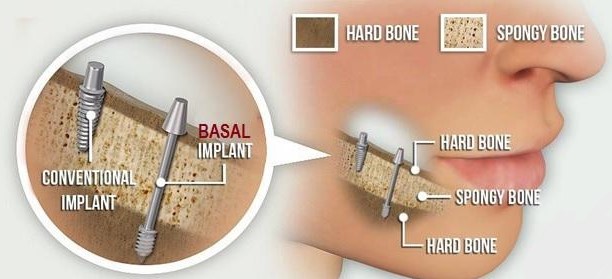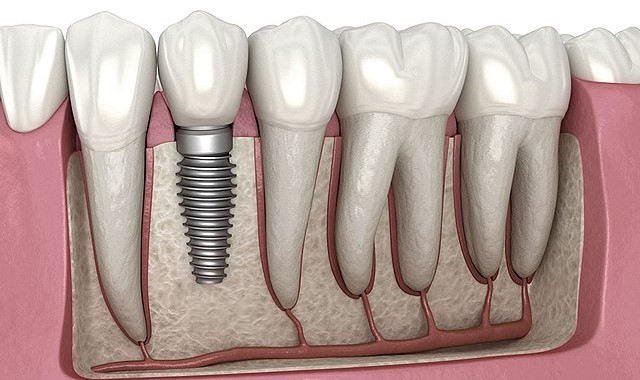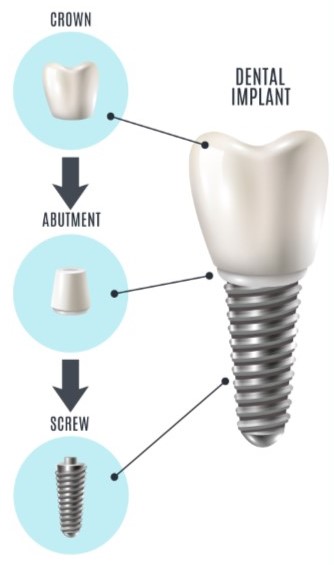Basal implants, also known as cortical implants or bicortical implants. They are a type of dental implant that differs from traditional implants in their method of placement and design. Unlike traditional dental implants, which rely on a strong bone structure for support, basal implants are anchored into the basal bone, which is denser and more resistant to resorption.

Basal implants were developed in the 1970s and they have since become a popular alternative to traditional implants for patients who have insufficient bone volume or density due to atrophy or loss. These implants provide a stable base for tooth restorations, even in patients with compromised jawbones.
Indications for Basal Implants
Basal implants are typically recommended for patients with the following conditions:
– Loss of jawbone due to periodontal disease or injury
– Atrophy or resorption of the jawbone due to aging or tooth loss
– Inability to undergo bone grafting due to medical or financial constraints
– Desire for immediate loading of dental implants
Contraindications for Basal Implants
Certain conditions may preclude a patient from receiving basal implants, including:
– Uncontrolled diabetes
– High blood pressure
– Blood clotting disorders
– Chronic kidney disease
– HIV/AIDS
– Radiation therapy to the head and neck
COST OF BASAL IMPLANTS
The cost of basal implants can vary depending on the location, the number of implants needed, and the experience of the dental professional performing the procedure. However, basal implants are typically less expensive than traditional implants due to the reduced number of appointments required for treatment.
On average, basal implant surgery can cost around $4000 to $10,000 per arch in the United States. This price may include fees for the implants, surgery, temporary teeth, and final teeth replacement. Dental insurance may cover some of the costs associated with the surgery, but coverage may vary depending on the individual insurance provider.
It is best to seek a consultation from a dental professional specializing in basal implants to receive a more accurate estimate of the cost and to understand the payment options available, which may include financing, insurance coverage, or payment plans.
Advantages of Basal Implants
Basal implants offer several advantages over traditional implants, including:
– Minimal bone grafting required: Basal implants can be placed even in patients with insufficient bone volume, as they do not require as much bone as traditional implants.
– Immediate loading: Basal implants can be loaded with a dental restoration immediately after placement. This allows faster and more convenient treatment.
– High success rate: Basal implants have a success rate of up to 98%, making them a reliable choice for dental restoration.
Disadvantages of Basal Implants
While basal implants have many advantages, they also have a few potential disadvantages, including:
– Higher cost: Basal implants may be more expensive than traditional implants due to the specialized materials and techniques used.
– Less common: Basal implants are not as widely used as traditional implants, which may make it more difficult to find a qualified provider.
Procedure for Basal Implants
The procedure for placing basal implants typically involves the following steps:
– Evaluation: The dentist will evaluate the patient’s oral health, bone density, and other factors to determine if basal implants are a good choice.
– Treatment planning: The dentist will develop a customized treatment plan based on the patient’s specific needs and goals.
– Implant placement: Using specialized instruments, the dentist will place the basal implant into the jawbone.
– Dental restoration: After the implant has fused with the jawbone, the dentist will attach a dental restoration, such as a crown, bridge, or denture.
Overall
Basal implants are a viable option for patients with inadequate bone density or volume who are seeking dental restoration. While they may require a higher cost and more specialized care, the benefits of basal implants can help patients regain their confidence and quality of life. As with any dental procedure, it is important to consult with a qualified dentist who can evaluate the patient’s individual situation and recommend the best course of treatment.
Also Read About Dental Implants!
Also Read About FAQs For Dental Implants
FAQs
Here are some frequently asked questions (FAQs) about basal implants:
1. What are basal implants?
Basal implants, also known as bicortical implants or cortical bone screw implants, are dental implants that are anchored into the basal bone, which is the dense cortical bone that surrounds the jaw. Unlike traditional implants, basal implants do not rely on the density or volume of the jawbone.
2. Who can benefit from basal implants?
Basal implants are recommended for patients with insufficient bone density or volume in their jawbones, especially in the upper arch. Patients who have been told they are not good candidates for traditional implants due to bone loss may be eligible for basal implants.
3. How are basal implants placed?
The placement of basal implants involves a minimally invasive surgical procedure where the implants are anchored into the basal bone of the jaw. The implants are typically placed in one surgical session, and temporary teeth or bridges may be attached to them the same day.
4. What is the success rate of basal implants?
Basal implants have a high success rate, ranging from 95% to 100%. Success depends on various factors, including the patient’s oral hygiene status, the experience of the dentist, the quality of implants used, and the overall health of the patient.
5. Are basal implants more affordable than traditional implants?
Basal implants may be more affordable than traditional implants because they require fewer appointments and do not require additional procedures such as bone grafts. The overall cost of the implants may vary depending on individual cases.
6. Is any special care required after basal implant surgery?
Patients are advised to maintain good oral hygiene, including brushing and flossing regularly, visiting the dentist for follow-up appointments, and avoiding hard, crunchy foods that may damage the implant site.



